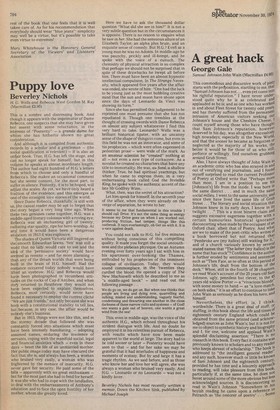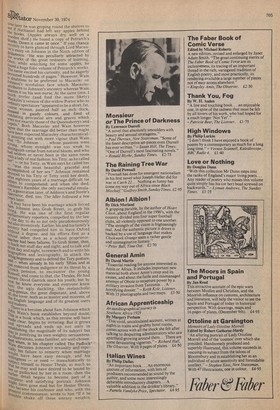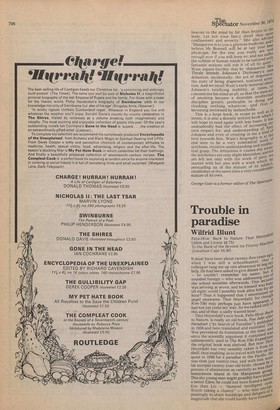A great hack
George Gale
Samuel Johnson John Wain (Macmillan £4.95) This commodious and discursive work of pietY starts with the prdposition, startling to me, that "Samuel Johnson has not ... even yet come int° his rightful reputation." I have never understood quite why he is as celebrated and, applauded as he is; and as one who has worked in and about Fleet Street for twenty odd yearS, and has thereby suffered from the permanent intrusion of American visitors seeking ollt, Johnson's house and the Cheshire Cheese, count myself among those who have thought that Sam Johnson's reputation, however deserved in his day, was altogether excessivelY high nowadays, especially in the New World, and that the sooner he became as forgotten or neglected as the majority of his works, the better it would be for those of us who still, perforce or willingly, find ourselves grubbing around Grub Street.
Also, I have always thought of John Wain as an academic critic who has also strayed in and out of versifying and journalism, and I found myself surprised to read the current Professor of Poetry at Oxford write that "Perhaps more than most, I am in a position to see his [Johnson's] life from the inside. I was born in the same district . . . and in much the same social milieu. [went to the same university, and since then have lived the same life of Grub Street .. The literary and social situation that Johnson knew in its early days, I know in itS twilight . . ." This is a most bizarre claim anu suggests excessive eagerness together with a certain humourless historical ignorance disconcerting when made by the occupant of all Oxford chair, albeit that of Poetry. And Whet, are we to make of the poet-critic who writes 0' a book borrowed but not returned that "Pembroke are (my italics) still waiting for it,' and of a church variously known by several ' stated names that "The latter (my italics) is the name that has stuck"? Confidence in the author is further eroded by sentiments and sentences, such as "Then Fate, as so often at this period ei Johnson's life, dealt from the bottom of the deck." When, still in the fourth of 30 chapters, we read Wain's account of the 25 years old SOD Johnson, ugly, penniless but clever, to the 45, years old widow Porter — a "vivacious blonde' with some money to hand — as "a love-match' on both sides," it is an effort to continue to take John Wain as seriously as he does his hero, and himself.
Nevertheless, the effort, is, I think, worthwhile. There is a great deal of stuff, or stuffing, in this book about the life and times,of eighteenth century England which could be obtained from the same printed (and acknoviledged) sources as John Wain's; but it is not for me to object to synthetic history and biographY and I, for one, welcome and applaud Wain's splendid disclaiming assertion: "There is no research in this book. Every fact it contains was previously known to scholars and to any reader who keeps abreast of scholarship." The book addressed to "the intelligent general reader and any such, however much or little he knows of Sam Johnson and the eighteenth centurY, provided he has time and a leisurely approach to reading, will take pleasure from this book, particularly if, at the same time, he does not ferret around some of the more obvious but less acknowledged sources. It is disconcerting t° read in Wain's Johnson "Somewhere in his boyish reading he came upon a reference to Petrarch as 'the restorer of poetry' . . Sorne The SPectator November 30, 1974 time later he was groping round the shelves to if Nathaniel had left any apples behind • books. (Apples always dry well on a .,..wooden shelf.) He found a copy of Petrarch's rworks. Down it came at once." If you chance ,:ecritlY to have glanced through Lord MacauBLrYi's essay on Johnson in the Ninth edition of thetarmlon: "He was peculiarly attracted by works of the great restorers of learning. °flee, while searching for some apples, he fillimd a huge folio volume of Petrarch's works. e name excited his curiosity, and he eagerly 1 ,"evoured hundreds of pages." However, Wain ,s doubtless to be preferred to Macaulay on `IrilMson's scrofulous face which Macaulay attributes to Johnson's ancestry whereas Wain inulames it on his wet-nurse. At the same time, I rvillaell Prefer (and find the more likely) eaulay's version of the widow Porter who to cejrdidarY spectators "appeared to be a short, fat, cl°r" woman, painted half an inch thick, erea-ssed in gaudy colours, and fond of ,..xhibiting provincial airs and graces which not exactly those of the Queensberrys and ani3els." Both Macaulay and Wain however eree that the marriage did better than might have b een expected,Macauley characteristicalPointing out with more vigour than Wain s"tar To Johnson . . . whose passions were di:cu.:rig, whose eyesight was too weak to "riguish cerise from natural bloom, and who ,\" ;!11, seldom or never been in the same room a lady of real fashion, his Titty, as he called ue• r", or his Tetty, as Wain says he called her ace was the most beautiful, graceful and oplhed of her sex." Johnson remained alvoted to his Titty or Tetty until her death, 'er
°the eighteen years of a marriage difficult for Jr,i, m to comprehend; and when she died, to""nson's Rambler, the only successful emulas a generation later, of Addison's and Steele's
v. Pee °tor, died, too. The Idler followed a few -ruarts later. saLt triaY have been his marriage which forced
ji,,.. Johnson into Grub Street, to grub his
g. He was one of the first regular roinlamentary reporters, compelled by the law bwrhe day to do so not only pseudonomously pov`:Iso inventively. Earlier, his and his family's upi,„_'-rtY had compelled him to leave Oxford se-rout a degree, and his efforts first as a t2dol usher then as a school proprietoric.ao eller had been failures. To Grub Street, then, drihek out stuff day and night, and to talk and day and night, to research and to write his viharaPhies and lexicography, to attack the andighegemony and to defend the Tory posture, las, when already in his early 'fifties and at ert; removed from indigence or its threat by a 11„"wo pension, to encounter the young 14i-swell, and come to that, the Thrales. He had 11214.'n David Garrick since his youth; but by h" he knew everyone and everyone knew hall): the ugly duckling, the melancholic alletkb-gerlius, the great disputant, and, above the ge lover, both as as master and mistress, of a,.,, -nglish language and of its greatest users "a joilhere is a heroism about Sam Johnson which Thin Wain's book establishes beyond doubt. Nacsi is a book which, as this review will have ande Clear, begins by irritating. But it grows est spreads and ends up not only in ai:olishing the magnitude of its subject but justifying its own weighty seriousness. al All;:strations, some familiar, are well-chosen. \;,?,`• When, in his chapter called The Padlock' ci:11,1) discusses Johnson's sexuality and espe4tY his failure to remarry when marriage wiVti have been easy enough, and his suls!tIgness — or need — masochistically to thveLct himself to Hester Thrale, so much so her`,.,ue may well have desired to be bound by earli' Padlocked by her in a room, then the conler detail begins to become part of a taipee,re and satisfying portrait. Johnson nave gone mad but for Hester Thrale, gre.became his confessor and who, with the po_Kest commonsense, wrote to him "If it be 4s1b1 e shake off these uneasy weights. heavier to the mind by far than fetters tO the body. Let not your fancy dwell thus LIP°11 confinement and severity. She also advisee! "Dissipation is to you a glorious medicine, and I believe Mr Boswell will, be at last your best physician, for the rest you really are we enough now if you will keep so; and not suffer the noblest of human minds to be tortured with, fantastic notions will rob it of all its elni.,,et: Wain argues forcibly that by 'dissipation' Pti.rs_ Thrale intends Johnson's Dictionary's oWn definition, incidentally: the act of dispersion; the state of being dispersed, scattered attenlion. And we recall Wain's early material about Johnson's terrifying inability, at times, "Pt concentrate his mind atoll, so that the mere act of smoking became a desirable intellectual discipline greatly preferable to doing ant', thinking nothing whatever, and thus eu becoming terrorised by melancholia. This is a large book, in scope as well as ni intent; it is also a densely written book which will hope to read again with less haste. It has undoubtedly had the effect of increasing own respect for, and understanding Johnson and even of creating in me a kine.°c _ love towards him. Wain's biography is at trie end seen to be a very substantial work 13' synthesis, intuitive understanding and intellectual grasp. The irritations it causes slip awaY the infelicitie3 are only slight blemishes; and we are left not only with the work of piety we started with but also with a work which b,'„tY. persuading us of the stature of its suu-e-,:ie establishes at the same time a very considerau stature of its own.
George Gale is a former editor of The Spectator'












































 Previous page
Previous page